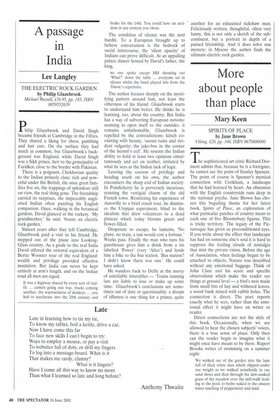A passage in India
Lee Langley
THE ELECTRIC ROCK GARDEN by Philip Glazebrook Michael Russell, .£16.95, pp. 183, ISBN 0859552659 Philip Glazebrook and David Singh became friends at Cambridge in the Fifties. They shared a liking for chess, gambling and fast cars. On the surface they had much in common, but Glazebrook's background was England, while David Singh was a Sikh prince, heir to the.principality of Faridkot, close to the border with Pakistan.
There is a poignant, Chekhovian quality to the Indian princely class: rich and powerful under the British, the once great families live on, the trappings of splendour still on view, the real thing gone. The friendship carried its surprises, the impeccably anglicised Indian often puzzling his English companion. Once, walking in the botanical gardens. David glanced at the rockery. 'My grandmother,' he said. 'boasts an electric rock garden.'
Sixteen years after they left Cambridge, Glazebrook paid a visit to his friend. He stepped out of the plane into LookingGlass country. As a guide to the real India David offered the oriental equivalent of a Bertie Wooster tour of the real England: wealth and privilege provided effective insulation. But India can never be kept entirely at arm's length, and on the Indian road all men are equal:
It was a highway shared by every sort of traffic ... camels going one way, trucks coming another, the waywardness of donkeys ... you had to accelerate into the 20th century and brake for the 14th. You could have an accident in any century you chose.
The condition of silence was the next hurdle. To a European brought up to believe conversation is the bedrock of social intercourse, the 'silent opacity' of Indians can prove difficult. At an appalling palace dinner hosted by David's father, the king,
no one spoke except HH shouting out 'What?' down the table ... everyone sat in silence whilst the band played hits from the Titanic's repertoire.
The author focuses sharply on the mystifying pattern around him, not least the otherness of his friend: Glazebrook starts to understand him better. He thinks he is learning, too, about the country. But India has a way of subverting European notions: seeming to open itself to the outsider, it remains unfathomable. Glazebrook is repelled by the contradictions: kitsch coexisting with beauty, 'sunset ruins and strident vulgarity; the juke-box in the corner of the hermit's cell'. He resents the Indian ability to hold at least two opinions simultaneously and act on neither, irritated by what he sees as the Indian lack of logic.
Leaving the cocoon of privilege and heading south on his own, the author encounters the sharp end of Indian society. In Pondicherry he is perversely incurious, resisting the vestigial charm of the old French town. Restricting his experience of Auroville to a brief coach tour, he dismisses the Utopian experiment, blind to the idealism that drew volunteers to a dead plateau which today blooms green and flower-filled.
Desperate to escape, he laments, 'No plane, no train, a taxi would cost a fortune.' Weeks pass. Finally the man who runs his guesthouse gives him a drink from a tin labelled 'Power' (very 'Alice') and lends him a bike to the bus station. 'Bus station? I didn't know there was one.' He could have asked.
He wanders back to Delhi at the mercy of unreliable timetables — 'Trains running late are liable to lose or make up some time.' Glazebrook's conclusions are sometimes out of date or questionable: a dream of idleness is one thing for a prince, quite
• another for an exhausted rickshaw man. Felicitously written, thoughtful, often very funny, this is not only a sketch of the subcontinent, but a portrait in depth of a pained friendship. And it does solve one mystery: in Mysore the author finds the ultimate electric rock garden.


































































 Previous page
Previous page